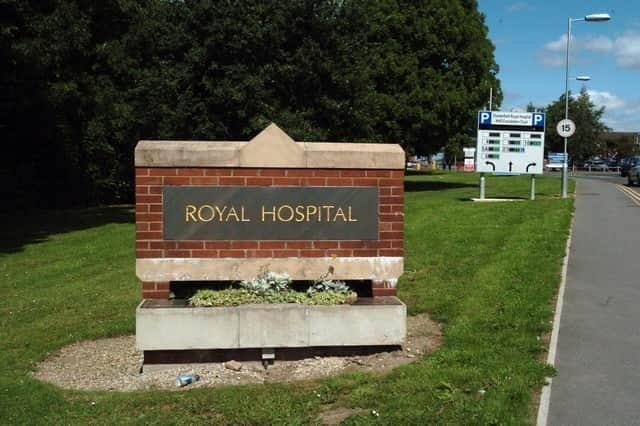NHS chiefs issue plea as Derbyshire health system faces 'significant pressure'
and live on Freeview channel 276
Trust leaders have warned hospitals are ‘dangerously busy’ across England as nine in 10 acute hospitals in the country had more than 85% of their beds filled in the week ending December 18. Chesterfield Royal Hospital had 96.3% beds occupied on December 18, with only 20 beds available according to the latest figures.
Dr Chris Weiner, Executive Medical Director for NHS Derby and Derbyshire, said: "The Christmas bank holiday period saw significant pressure across the Derbyshire health and care system. We are open for business and our services are there for anyone who needs them but we are prioritising patients with the highest level of need, particularly those requiring urgent and emergency care.
Advertisement
Hide AdAdvertisement
Hide Ad"There are things everyone can do to help, and we are asking people to use our services wisely and to think about self-care as an option for some conditions, such as coughs and colds, before automatically going to the NHS for help. If self-care isn't an option, then choosing the right service for the condition will help patients to get the right treatment first time and usually more quickly. 111.nhs.uk is a great resource to help with that.


"We are expecting the New Year bank holiday to be particularly busy so we are asking people to plan ahead around important things like repeat prescriptions but also to think about how they can support our health and social care system at the busiest time of the year."
Derbyshire Health and Care teams continue to work exceptionally hard and we would like to reassure our patients and the public that despite the challenges faced, essential services remain fully open for anyone who needs them so if you require urgent medical help, you should continue to come forward.
Other things which everyone can do to help the NHS right now, include:
Advertisement
Hide AdAdvertisement
Hide Ad• Only call 999 or attend accident and emergency departments when someone is seriously ill or injured and their life is at risk.


• When needing urgent medical care but it’s not an emergency, visit NHS 111 online - 111.nhs.uk - or call NHS111 for advice on how to get care at any time of day or night.
• Utilising an Urgent Treatment Centre (UTC) if you have a minor illness or injury, such as sprains, fractures, minor burns, skin infections, animal bites, minor eye and head injuries, stings and bites. Urgent treatment centres/Minor Injury Units are available 8am-8pm in Derby, Ilkeston, Ripley, Darley Dale, Buxton, Lichfield and Tamworth and can help with care and treatment for many of the most common issues that people attend emergency departments for. They will often be able to help get the care needed more quickly than accident and emergency departments. Please only attend a UTC if you need urgent treatment for an illness or injury.
• See a pharmacist for advice on a minor illness such as a cough or cold. Pharmacists are experts in medicines who can help you with minor health concerns. As qualified healthcare professionals, they can offer clinical advice and over-the-counter medicines for a range of minor illnesses, such as coughs, colds, sore throats, tummy trouble and aches and pains.
Advertisement
Hide AdAdvertisement
Hide Ad• Contact your GP for symptoms that won't go away, such as lumps, unexpected weight loss, abnormal bleeding and persistent pain.
• Check on neighbours, friends and family who have an existing respiratory condition, to ensure they are okay and not suffering from additional wheeziness or shortness of breath. It is also important to ensure they are following their care plan with medication, inhalers and oxygen support. If you are concerned and feel you need clinical advice, use NHS 111 online or call 111. It is essential that they receive treatment early and seek to prevent an admission to hospital.
• Support loved ones who are ready to leave hospital by doing six simplethings:
• Bring clothes for leaving hospital
• Arrange access to their home or place they call home and to check on
heating and food
• Check transport arrangements
• Ensure they have any dressings or equipment they need
• Confirm any follow up appointments
• Check for valuables and belongings when leaving
Advertisement
Hide AdAdvertisement
Hide Ad• Please continue to treat all NHS and care staff with the respect they deserve. Our hard-working staff and volunteers are doing all they can to keep patients safe and supported.
• If unable to make any NHS appointment, please contact the number on appointment letters so that it can be reallocated to another patient.
There is a range of other steps the community can take at this time help the NHS, and further information is available here.
Comment Guidelines
National World encourages reader discussion on our stories. User feedback, insights and back-and-forth exchanges add a rich layer of context to reporting. Please review our Community Guidelines before commenting.